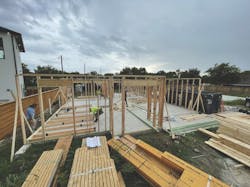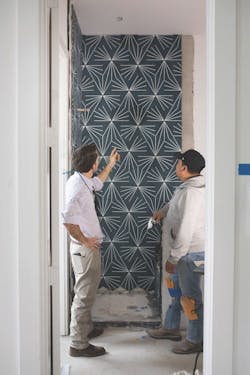Effective Trade Partnerships
When Frankel Building Group was named the National Association of Home Builders’ 2021 Custom Home Builder of the Year, the 36-year-old Houston company shared the recognition with its vendors and trade partners. “They felt like they’d won, too,” says co-president Scott Frankel. Inspiring an attitude of quality and excellence among the trade partners Frankel Building Group works with to build its homes is critical to the company’s success, Frankel believes. “A good custom builder is only as successful as its trade partners,” he says.
In today’s market, characterized by supply chain disruptions, material delays, and a labor shortage (by some estimates, the construction industry needs 650,000 new workers per year), cultivating and nurturing trade partner relationships and creating loyal bonds is more important than ever. And while developing trade relations can be challenging, there are proven ways to create solid connections.
Start With Words
“Terminology matters,” according to Wes Carroll, president of Upright Builders, a custom and small-volume production builder in Cary, N.C. For example, many builders refer to trade partners as “subcontractors,” or just “subs,” “so there is a tendency to see them as people who work for us, as opposed to people working with us to reach a common goal: a quality home delivered to a client,” Carroll says.
Or worse, says Joshua Correa, owner of Divino Homes, a diversified builder-remodeler doing multimillion dollar projects in Dallas: “‘Sub’ sounds like someone beneath you.” Correa should know; he started out as a plumbing contractor working for a large production builder. “These are people who work hard, and I value them highly,” he says.
Using the term “trade partner” rather than “subcontractor” may seem like a trivial variation in terminology, but Carroll believes it’s far more than that: “It’s a mindset that becomes part of your company culture,” he says, and sets the stage for how you treat people and how they treat you.
Peer-to-Peer Partnerships
Frankel, Correa, and Carroll agree that seeing trade partners as equals means showing them respect by valuing their work, treating them fairly, not “blowing smoke,” not disrespecting their schedule, and ensuring you pay them on time. Those habits breed loyalty.
Some of Frankel Building Group’s (FBG) trade partners have been with the builder for more than 30 years, and Frankel finds it encouraging to now work with the sons of the tradespeople his father worked with. “One of the first things my dad said to me when I started working with him in 2006 was that trade partners shouldn’t be taking me out to lunch,” he says, “because it’s a shared relationship.”
For its projects, FBG draws its own plans, and trades will come in to pick them up, meet with the designers and architects, and have coffee, Frankel says. To show its appreciation, FBG also hosts an annual bash for its trade partners and vendors that has become a big deal for the more than 200 people who attend.
When it comes to scheduling, government regulations define the legal parameters for employees versus independent contractors. Recent and ongoing material delays and limited supply of available trade partners further complicate the scheduling process. What’s critical on any build, Carroll says, is for builders and trade partners to communicate often and clearly about scheduling, and for builders to hold tradespeople accountable for respecting the schedule. But on the flip side, builders should also respect their trade partners’ time, since trades are likely working for several other builders as well.
In addition, a good relationship with your trades can provide some advantages in scheduling flexibility. “Sometimes it looks like we may need to extend the build time,” Carroll says, “but then our tradesperson might say, ‘I’ll bring in the guys on Saturday to catch up.’”
A glass installer who has been working with Divino Homes for nine years told Correa he’s loyal to the builder because Correa doesn’t B.S. him. “I make a decision and then it’s done, and I don’t beat him up on price,” Correa says.
Not haggling with trades over pricing is one way to show you value their knowledge and regard them as peers. It may also have a positive effect down the line. During the Great Recession, Carroll says the builder didn’t beat its trades up on cost, and as the company and industry emerged from the downturn, and labor and personnel were in high demand, that loyalty—for the most part—was returned. “The best way to inspire loyalty among trade partners is to maintain your loyalty to them,” Carroll says.
And while it may sound simple enough, paying on time and removing barriers to payments is important in a relationship built on equality. “Our vendors and trade partners tell us they appreciate us paying on time,” Carroll says. He acknowledges that “some of our folks are not too sophisticated. One painter still handwrites his invoice, takes a picture of it, and texts it to us. But we don’t want to create hurdles to tradespeople getting paid on time, so we make it easy for him.”
Listen and Learn
The best way to forge these kinds of builder-trade relationships is through open communication. Builders, including Frankel and Correa, use construction management software, as well as texts, email, and phone calls to stay in touch. The software, especially, allows builders to be on the same page in real time with vendors, tradespeople, and even clients, from estimating through scheduling and other project management tasks.
Language gaps in the construction industry are a major challenge. In a 2019 survey by the American Council on the Teaching of Foreign Languages, 42% of construction employers said they rely “a lot” on employees with foreign language skills. Divino Homes’ supervisors speak English and Spanish, “so they can communicate clearly with the guys on the ground,” Correa says.
Being able to speak the same language can speed up jobs because directions can be explained and understood more quickly, and clear communication results in fewer safety issues—something that can make trade partners feel more protected and cared for on site.
When it comes to old-school communication, the key is to be available. “If you call me, I’ll call you right back,” Frankel says. “It’s important your trades know that if something isn’t going right on a jobsite, they can just pick up the phone.”
Evaluate and Educate
“Be clear and consistent about expectations, demand the same from your trade partners, and you will see consistent results,” Frankel says. “Builders should be helping trades improve, whether it’s with training and development, management information systems, or buying tools and figuring out what they need to work more efficiently.”
On the education front, Correa works with his local Home Builders Association teaching classes for trades and builders to give them the tools needed to improve their interactions and build solid relationships. He recalls one class during which plumbers revealed their frustrations: “They told builders not to beat them up on price and to have realistic schedules,” he says. “Plumbers don’t have as many guys working now and they need more time. They wanted builders to learn how to talk to them.”
Correa says the builders in the room understood the trades’ concerns. One important suggestion made by the trade contractors was for the builders to confirm everything is ready for trades before scheduling them to come out to the jobsite. “That way, the trade partner can show up on a job and get the work done in a timely manner,” he says. Sometimes builders expect a tradesperson to partially start a job, even though not all selections or changes have been finalized, and then come back later to complete the job for the contracted price. “But that’s just not profitable from the trade’s perspective,” Correa adds.
If builders can help trade partners succeed, not only will trades be loyal, but Frankel believes it will help combat the labor shortage. If you invest in your trade partner relationships, he says, “they can focus on the things they need to do, like retaining new employees and growing with you.”
Stacey Freed covers design and the built world from her home in New York state.

